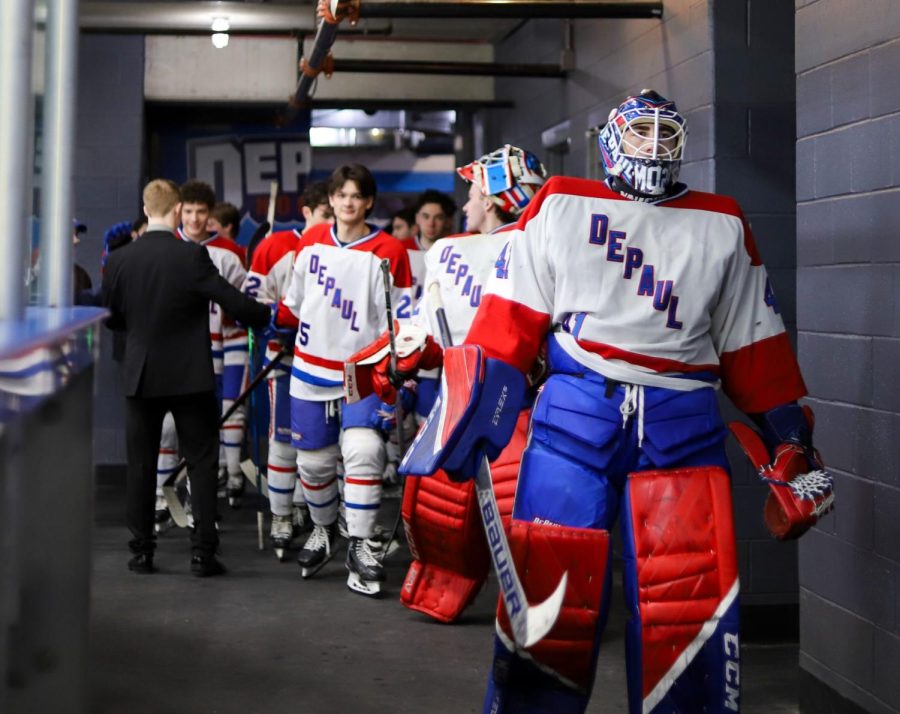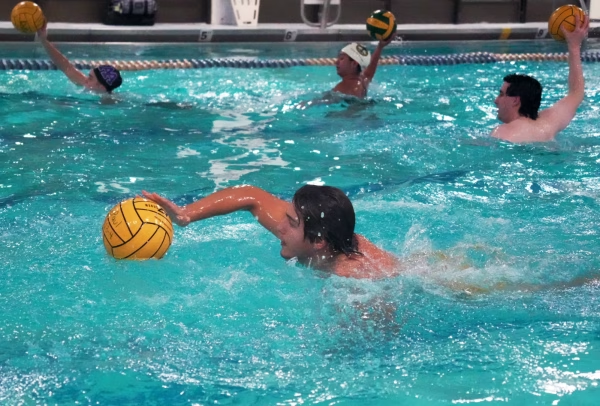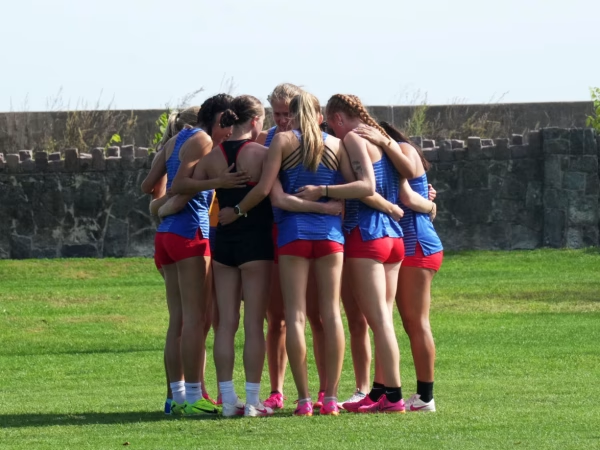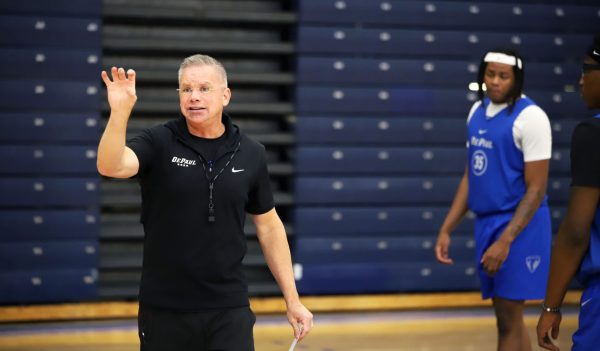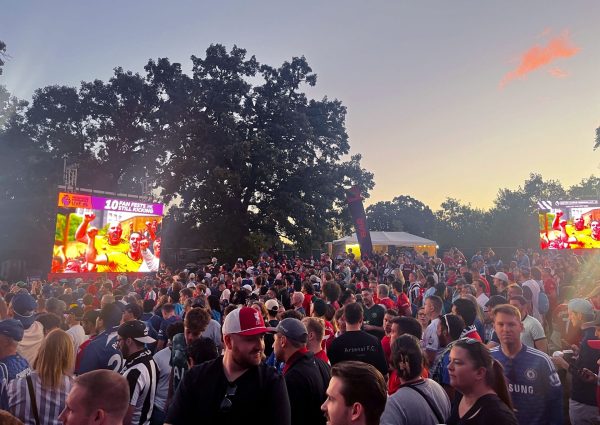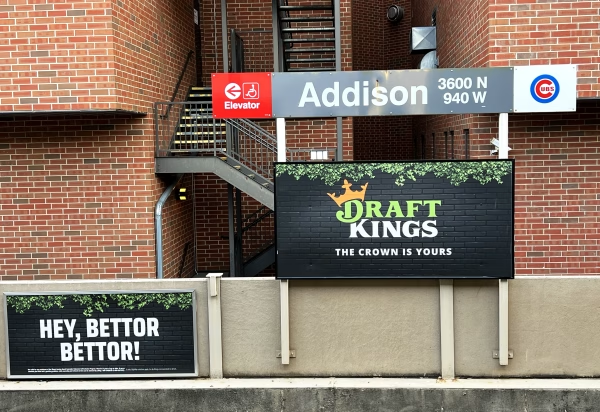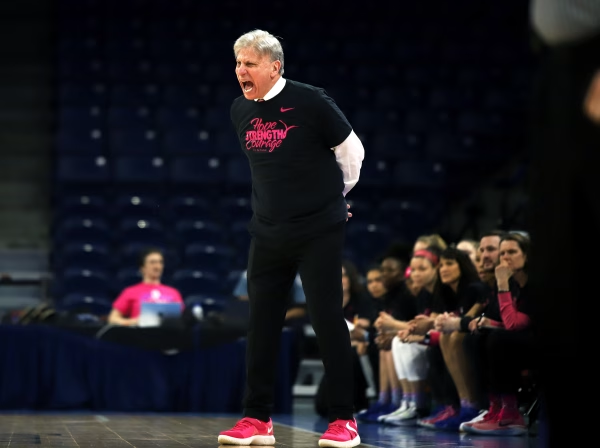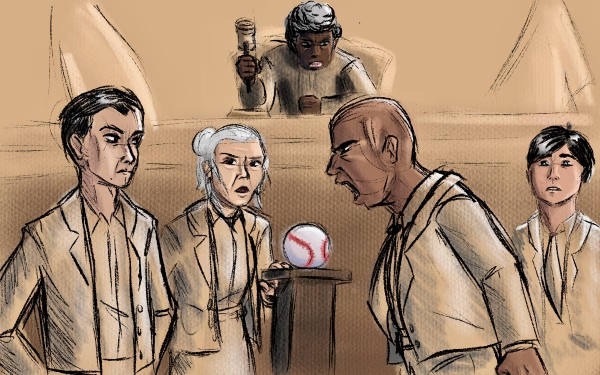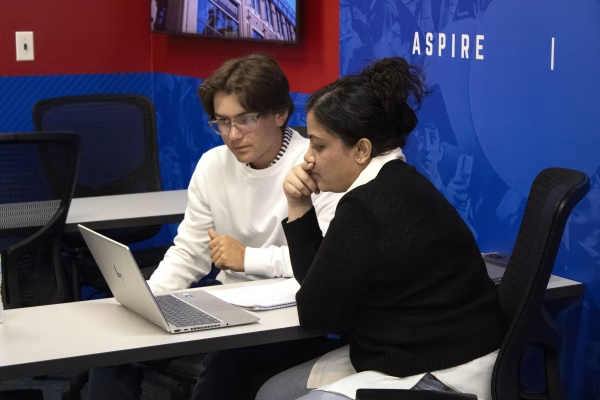Uphill battle: DePaul Hockey Club’s difficult quest for varsity status
Asher Motew (front) leads his teammates to the ice in DePaul’s 5-3 win over Concordia on Jan. 27.
Despite the DePaul Hockey Club being one of DePaul’s most successful athletic teams, becoming the university’s 16th NCAA team might not be in its game plan.
The team competes in the American Collegiate Hockey Association (ACHA) which, according to the league’s website, houses 461 colleges and university-affiliated teams in 48 states and two Canadian provinces. The site states it “provides a structure, regulates operations and promotes the sport of Hockey nationwide.”
As of now, there is not much talk within DePaul’s Athletic Department about the hockey club becoming NCAA recognized anytime soon.
“Currently, DePaul is focused on providing funding for its existing 15 sports at a level consummate with Big East Conference peers,” said Taylor Stapleton, Executive Associate Athletics Director for Revenue Generation and Strategic Initiatives. “We must continue to invest in our current facilities and operating budgets to reflect our competitive standards and allow us to recruit and retain high-caliber student-athletes across every sport.”
For DePaul hockey to reach varsity status quickly, a wealthy donor would need to back the program, which head coach Dan Wood said is what happened to Penn State University (PSU). In 2010, PSU received $88 million, left the ACHA and built a whole new facility.
DePaul Hockey currently rents ice time at Johnny’s IceHouse West, located at 2550 W. Madison St. The arena is just 15 minutes from the DePaul’s Loop campus and fans have consistently filled the bleachers throughout the season as the team grows in success.
However, Wood said that if DePaul were to implement an NCAA hockey team, it most likely would not override the current club.
“Historically, what has happened is as the team moves to Division I, they still keep their club team around,” said Wood.
Currently, Illinois has no Division I hockey teams despite producing the fifth-most Division I men’s hockey players in the nation, according to NCAA.com.
“There’s a lot of players that come out of Illinois that are playing college Division I hockey and going to the NHL, and there’s no Illinois Division I team,” said Asher Motew, DePaul Hockey Club goalie and team president. “I think that DePaul definitely has merit.”
Motew said that most people do not realize how competitive the ACHA is, and that some of his teammates have the talent to play Division I hockey, which they proved out on the ice this season.
The team won the Northern Collegiate Hockey League (NCHL) playoff championship on Feb. 10 for the first time in its history and qualified for regionals where its season came to an end after a 6-4 loss against the University of Iowa.
Wood said the team is just now gaining traction in the ACHA and many top programs are reaching out wanting to schedule games. Still, there has been no talk within the program about playing in the NCAA.
While DePaul might have the talent to play at that level, remaining a club sport has its advantages too. Club status attracts dedicated players to the program while teaching players life skills to apply on and off the ice.
“Everybody in the ACHA is playing hockey because they want to play and they’re paying to play on top of their tuition,” said Wood. “That’s the reason why we’re so successful this year is we’ve got a bunch of guys that care.”
ACHA teams do not receive scholarship funding for student athletes like NCAA teams do, which attracts players who are passionate about hockey and willing to do the work necessary to keep the program alive.
“No one’s making us play, and we’re not getting scholarships,” said Motew. “We’re playing for the love of the game, and I think that’s what differentiates us.”
Some of the costs associated with maintaining a club hockey team include paying for ice time to hold games and practices, paying for referees and funding travel costs for away games.
Most of these costs are covered by fundraising and sponsorships that are player-led and organized, as well as player dues which add up to $2,500+ per player.
“We streamed our games this year with ads from our sponsors, we hand out program guides that have all of our sponsors in a nice booklet, we did fundraising events like cancer nights and Greek nights,” Motew said. “We get creative to try and raise money.”
This season, the team raised $30,000 through fundraising alone.
“You’re essentially running a nonprofit as a 19, 20, 21-year-old,” Wood said. “An NCAA team would not be student led.”
If the DePaul Hockey Club were to become NCAA recognized, paid positions would substitute the marketing, advertising and coordinating roles of the student athletes.
According to NCAA.com, only about 7% of NCAA hockey players are drafted into the NHL and the percentage for ACHA players is even slimmer. Most ACHA players will become professionals in other fields after graduation, so having a degree backing their future is crucial, and having experience in leading a student organization is only to their benefit.
“It’s important for me that they get what they need from the school and grow as hockey players and as people,” said Wood.


